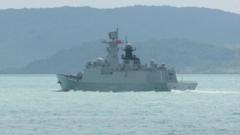On Friday, Chinese authorities notified airlines, including an Emirates flight, about the live-fire exercises while it was still en route. Australian Defence Minister Richard Marles emphasized that typical notification procedures were not adhered to, leading to further alertness. With military monitoring in place and communication dialogues conducted recently between Australia and China, officials continue to analyze the evolving situation.
The unexpected naval presence has drawn scrutiny and alarms, with the Australian government and airlines actively responding to ensure safety in air traffic and maritime operations.
China's live-fire drills have underscored the delicate balance of military operations and international law in a region that remains on high alert for maritime disputes.
Australia’s Prime Minister Anthony Albanese reassured that the activity, while concerning, did not pose an imminent threat to Australian or New Zealand security interests. Both countries are closely coordinating through defense channels, maintaining vigilant observation as exercises unfold.
This unusual military action follows previous tense exchanges between the two nations, highlighting ongoing regional tensions and the complex dynamics of international maritime activities.
In light of the situation, Qantas and other carriers are continuing to adapt routes while staying in touch with government officials to assess any potential risks as the military drills proceed.
While China describes the exercises as routine and adhering to international laws, the intensity of the response from Australia and New Zealand suggests that vigilance in the region will remain paramount.
The unexpected naval presence has drawn scrutiny and alarms, with the Australian government and airlines actively responding to ensure safety in air traffic and maritime operations.
China's live-fire drills have underscored the delicate balance of military operations and international law in a region that remains on high alert for maritime disputes.
Australia’s Prime Minister Anthony Albanese reassured that the activity, while concerning, did not pose an imminent threat to Australian or New Zealand security interests. Both countries are closely coordinating through defense channels, maintaining vigilant observation as exercises unfold.
This unusual military action follows previous tense exchanges between the two nations, highlighting ongoing regional tensions and the complex dynamics of international maritime activities.
In light of the situation, Qantas and other carriers are continuing to adapt routes while staying in touch with government officials to assess any potential risks as the military drills proceed.
While China describes the exercises as routine and adhering to international laws, the intensity of the response from Australia and New Zealand suggests that vigilance in the region will remain paramount.


















